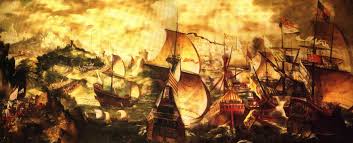Because most territories in the empire were self-governing and Spain never came to develop an imperial bureaucracy, the main cost incurred was in defence rather than in administration. The demands of war always used up the bulk of government money. The financial implications of war during the ‘imperial century’, 1560–1660, dragged Castile into foreign commitments that came to absorb the bulk of state revenue. Repayment of state bonds (juros) for loans by bankers and others, absorbed by the end of Charles V’s reign in 1556 some 68 per cent of normal Castilian revenue. By 1565 the figure was up to 84 per cent, and by the end of Philip’s reign in 1598 the total juro debt was nearly eight times that of annual revenue. The cost of imperialism was clearly ruinous: in 1634, under Olivares, over 93 per cent of expenditure was earmarked for foreign policy. Felipe Ruiz Martín concludes that ‘war cut short the positive evolution of Spain by absorbing resources which would normally have served to increase production. … The proliferation of juros checked growth. … War, for Spain, had a decisive influence on the economic process’.
But the costs were not borne only by Spain, nor was the impact of war limited to Spain alone. A good example is the battle of Lepanto (1571), the famous naval victory of Christians over Turks. Parker and Thompson have shown clearly that tax grants made by the papacy to Spain covered the greater part of Spain’s costs. In the same way, at every stage of imperial history it was the Italian, German and other foreign bankers who supplied the credit that made it possible to launch military campaigns.
Though much research exists on finances, relatively little has been done on the mechanics of Spanish imperialism or on the part Spanish resources played in relation to those of other countries. There is no adequate history of the Spanish military forces in the age of empire, though an excellent general survey has been done by Jan Glete. Aspects of science and technology are touched on by Goodman. On questions of manpower, Parker has convincingly studied the military relationship between the peninsula and the Netherlands, and in the process has given us splendid insight into the mechanics of the sixteenth-century army in Flanders. Thompson has also looked at recruitment during the same period, but for the entire seventeenth century we remain in the dark about the recruitment, officering and administration of the Spanish forces. We only know that by the War of Succession the army was no match for its enemies, relied heavily on foreigners as general officers, and won victories only when aided by the French army. Thanks to the extensive research generated by commemoration of the 1588 Armada in 1988, there are now many good studies of naval affairs. Spain’s capability in shipbuilding is not in doubt: well into the late seventeenth century, the epoch of alleged decline, a sample of 239 vessels used in the American trade shows that only 37 per cent were foreign-built, the rest being constructed either in America or in Spain, mainly in Basque shipyards. On the supply of war-materials, there is a key study of the iron industry of northern Spain, but little information about armaments, gunpowder, and related items has yet emerged, leaving one to suspect that Spain had little. This is not wholly surprising, since Spain’s wars tended to be fought abroad, not at home, and it was more sensible to supply the army of Flanders from the more industrialised Netherlands and Liège, and the army of Milan from Milan itself. The peninsula, so easily invaded during the War of Succession, was just as defenceless over a century earlier, when the English in 1596 captured and held Cadiz for three weeks. The evidence suggests not so much a decline as a failure right from the start, to build up the defences of the peninsula.
The old and simplistic picture of two rival policy factions under Philip II, one of the duke of Alba which favoured a ‘ruthless’ solution to imperial affairs and the other of the prince of Eboli which favoured ‘negotiation’. In practice, issues were never seen in such stark ‘war’ and ‘peace’ terms. Alba, like any professional soldier, wanted a quick, clean military solution; he thought that this was possible in Flanders just as he later thought it was not possible in England and so opposed the ‘war’ policy of Granvelle and those who counselled an invasion.
Most surprising of all for a country which relied so heavily on communications, the Spain that had been able to muster enormous armadas in cases of emergency never succeeded in establishing a good regular navy, and throughout the seventeenth century the clearest index to the crumbling of its hegemony is the series of naval defeats it suffered at the hands of the Dutch (from the plate fleet in 1628 to the Downs in 1639), the English (from Drake’s sacking of Santo Domingo in 1585 to Blake’s attack on the plate fleet in 1657), and the French (from Guetaria in 1638 to the bombardment of Barcelona and Alicante in 1691).
